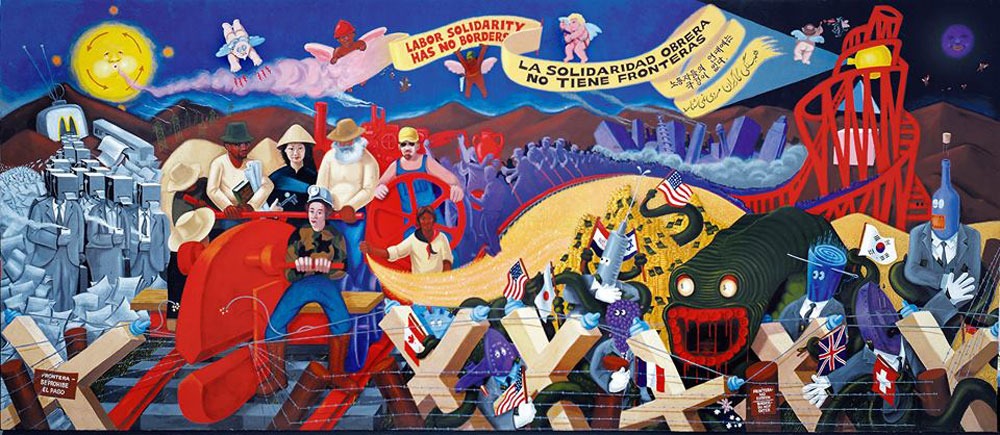
The COVID-19 pandemic is global, but the US has mishandled the novel coronavirus to a unique degree. All of the spin in the world cannot hide the fact that over 200,000 Americans, a fifth of the world’s total, have lost their lives due to COVID-19. This is a failing, to use Dr. Anthony Fauci’s phrase from this past March. Less discussed is one of the causes of that failing—namely, a lack of worker power.
What does a lack of worker power have to do with a public health emergency? Consider this: Just last week, JBS, a $52-billion corporation, was fined a mere $15,615 for the death of eight meatpacking workers at its Colorado facility. This, of course, is just one of countless examples we’ve seen in the past six months of “essential workers” being discarded as inessential when the worst happens.
Why does this happen? Answer: a lack of worker power.
Unions, a central tool for worker voice, have been vitiated over the past half-century. In 2019, just over 10 percent of American workers belonged to a union, down from nearly 30 percent in the 1960s. Without collective power, ordinary people often have very limited means to ensure protection for themselves from a once-in-a-century public health emergency.
But while union workers like us may be down, we are not out. And, indeed, we’ve seen, both in the years prior to the pandemic and during it, a rise in workers seeking union protections, including for nonprofit workers like ourselves.
Our jobs are certainly less risky than those who process meat. All three of us work for the Center for American Progress (CAP), a nonprofit think tank in Washington, DC. We advocate for critical policy interventions every day, which is why we know that government policies—even progressive policies like the ones we advocate for—are just one piece of what workers need. As the old adage says, in unity there is strength, which is why we came together to have a union of our own.
Unions are a powerful tool for advancing economic and racial justice, especially during an economic and public health emergency that disproportionately impacts Black, Latinx, and Indigenous workers.
For example, union teachers in Michigan have been able to use their collective voice to negotiate new safety measures in light of the pandemic, including hazard pay, additional sick time, and free ongoing testing. Broadway actors, stagehands, and other creative professionals used the power of their unions to lobby for and secure economic assistance for those out of work. And unionized grocery store workers have used their power to advocate for pay increases, more testing and personal protective equipment (PPE), additional paid leave, and customer limits.
What people may not realize is that all types of workers belong to unions. For some people, the word “union” still conjures the image of a Detroit automobile factory. Yet 40 percent of union members today work in education and health services. Over a third of union members are people of color, and nearly half are women.
As nonprofit workers at a policy thinktank, we realize we are relatively shielded from some of the worst conditions that others face. And yet young workers like us, and especially those of us who are workers of color, face considerable market vulnerability. Without a union, many in our sector face long hours for low wages under the burden of sky-high rents and student loans. One of us, for example, was paying nearly $300 a month on student loan debt before payments were frozen due to the pandemic. The COVID-19 pandemic has only exacerbated the potential for unsustainable working conditions at nonprofits. In order to create an equitable and accessible workplace for everyone, workers must have a say in guiding workplace issues that may surface, such as remote work, sick leave, and even potential layoffs.
As CAP Union members, affiliated with the Nonprofit Professional Employees Union (NPEU), we count ourselves incredibly lucky that our workplace is protected by a collective bargaining contract. Since our organization unionized in 2016, salaries for entry-level positions have increased by 25 percent, and overtime protections have expanded to everyone making just under $50,000 a year. These salary increases are critical in a city where the median rent on a one-bedroom rental is more than $2,000 a month.
Working with CAP management, our union contract also codified progressive policies like 12 weeks of paid family leave, additional time off, flexible work schedules, caregiving leave that includes domestic partners and chosen family, and even paid safe days for survivors of gender-based violence, helping CAP show its commitment to progressive values as we advocate for these changes in law.
Sign up for our free newsletters
Subscribe to NPQ's newsletters to have our top stories delivered directly to your inbox.
By signing up, you agree to our privacy policy and terms of use, and to receive messages from NPQ and our partners.
These measures help support good, living-wage jobs—in other words, unions help actualize the social justice missions of nonprofits in their daily practice.
But having a union is about more than wages and benefits. It is also about ensuring that workers like us have an effective voice at work. The communication channel that unions provide is particularly vital at times of crisis like now.
For example, many of us at CAP were shaken both by the police killings of George Floyd and Breonna Taylor and by the military tear-gassing of peaceful protestors that took place in early June at Lafayette Square, which happens to be just blocks away from our nonprofit’s central headquarters office. Working through our union, we raised our concerns, and management responded, with CAP implementing organization-wide days off for the National Day of Mourning and Juneteenth following the nationwide protests against police brutality.
As union members, we’re never alone. We come to work every day with the full force of our contract—not to mention more than 100 of our fellow unit-members and a coalition of 25 (and counting) other unionized nonprofits across the country—behind us. For many of us, our union is one of our favorite things about our jobs.
In an era where inequality is greater than ever before, wages are largely stagnant, and basic rights for all kinds of workers are under attack, nearly all workers could benefit from a union. For example, union workers earn roughly 12 percent more on average than nonunion workers. That premium is even larger for workers of color: new research shows that Black unionized workers earn around 14 percent more than their non-union peers and Latinx unionized workers earn around 20 percent more.
At a time when our civil rights are under attack from all directions, unions are also a powerful tool for securing equity and justice in the workplace. For example, until a recent US Supreme Court decision, only 21 states prohibited employment discrimination based on sexual orientation or gender identity, yet unions were able to use their contracts to implement workplace protections that go beyond what is required by law. Indeed, some union workers have used their collective power to expose and eliminate pay disparities within their organizations based on gender and race, by raising pay for everyone.
The benefits of unions extend even beyond our membership ranks, since research consistently shows that unions reduce income inequality overall. They also provide a counterweight to ever-growing corporate power by boosting democratic participation and acting as lobbyists for pro-worker policies such as a higher minimum wage and expanded healthcare access.
So, what to take from our experience? If you are a staff member at a nonprofit, we encourage you to consider the benefits of organizing. In the past month alone, nonprofit workers have formed new unions at the Congressional Progressive Caucus Center, Feminist Majority Foundation, Scholars Strategy Network, New American Leaders, Innovation Law Lab, and The Hub Project. And just months ago, workers also unionized at the Washington Center for Equitable Growth.
And if you’re a nonprofit manager or board member, we encourage you to work with unions and workers as partners, not see unions as something to “avoid.” We are well aware that there is an entire union-busting industry out there. Certainly, it is possible for a nonprofit board to spend thousands or even tens of thousands of donor dollars on lawyers who will tell you to not voluntarily recognize the union and instead insist on a prolonged election process, and advise you on how to postpone the election date, reduce the number of people in the union, and even how to intimidate workers to vote against the union when an election is held. A nonprofit board and management can do this—but not without doing grievous harm against their social justice missions.
Meanwhile, and more fundamentally, a nonprofit board and management that acts this way fails to seize the opportunity that a staff union provides—namely, the chance to democratically address and work out disagreements in a mutually productive fashion. And yes, for this to occur, requires unions, workers, and nonprofit boards and managers to keep our eyes on the prize and work together to achieve our missions—but isn’t that what nonprofits are about?
The bottom line: when we support unions, we also help develop a more just economy and a safer, more equitable society at large. Everyone stands to gain from greater workplace democracy, particularly the workers at the intersection of multiple marginalized identities such as race and gender. Our experience with CAP’s union highlights what many of us already know: unions are one of the best ways nonprofits like ours can ensure that their missions of a fairer, more equal society are realized.
Juli Adhikari is the Head of Organizing at the CAP Union. Thomas Waldrop is the Head of Representation, and Malkie Wall is a member.










